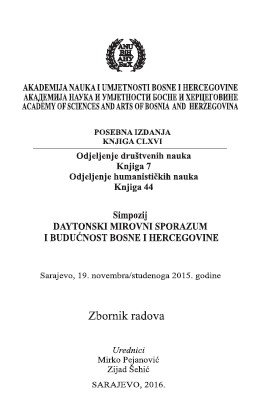POLITIČKI PLURALIZAM I PARLAMENTARNA DEMOKRATIJA U BOSNI I HERCEGOVINI U POSTDEJTONSKOM VREMENU
POLITICAL PLURALISM AND PARLIAMENTARY DEMOCRACY IN BOSNIA AND HERZEGOVINA IN POST-DAYTON TIME
Author(s): Mirko Pejanović
Subject(s): Political history, Government/Political systems, Political behavior, Transformation Period (1990 - 2010), Present Times (2010 - today), Inter-Ethnic Relations
Published by: Akademija Nauka i Umjetnosti Bosne i Hercegovine
Keywords: political pluralism; parliamentary democracy; coalition agreement; partitocracy; High Representative of the international community (OHR);
Summary/Abstract: This paper elaborates the genesis of the establishment and development of political pluralism in Bosnia and Herzegovina starting from the hypothesis that the power of the ruling ethnic parties did not allow the building of consensus in the adoption of laws necessary for the development of the state of Bosnia and Herzegovina in the post-Dayton period. Three ethnic parties: SDA, HDZ and SDS, after winning the first multiparty elections in 1990, based the exercise of authority by the Parliament of Bosnia and Herzegovina’s on the principle of partnership, and not on the democratic principle of establishing a coalition political agenda for the exercise of power in the won mandate. The partnership between the parties in government took place on matters where there was mutual consent. In the first post-war elections, held in September 1996, the same three ethnic parties won again: SDA, HDZ BiH and SDS, with 86% of votes of the electorate. Ethnic parties thus again after the war gained the dominant power in the entity parliaments and the Parliamentary Assembly of Bosnia and Herzegovina, to which the constitutional structure of Bosnia and Herzegovina defined in Dayton also contributed. In Parliament of Bosnia and Herzegovina they applied this power in the form of partnership in government. What lacked was the determination of the coalition agreement and the political program of the coalition as the indispensable basis for consensus in the adoption of laws. As a result, in the Parliamentary Assembly of Bosnia and Herzegovina there was no consensus between the ruling parties on the most important issues for the development of the state of BiH. It was not possible to strengthen the power of the Parliament and to develop parliamentary democracy. Laws promulgated by the OHR enabled major reforms in the process of integration of Bosnia and Herzegovina into the European Union. Instead of the power of the Parliament, we see the power of party elites. Instead of parliamentary democracy, we see partitocracy.
Book: DAYTONSKI MIROVNI SPORAZUM I BUDUĆNOST BOSNE I HERCEGOVINE
- Page Range: 193-210
- Page Count: 18
- Publication Year: 2015
- Language: Bosnian, Croatian, Serbian
- Content File-PDF

